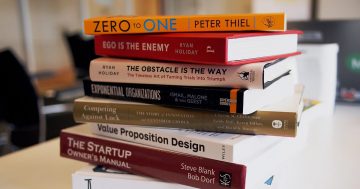Aytekin Tank* says that self-improvement isn’t a one-size-fits-all approach and benchmarking our progress against others can be counterproductive.
 If there was a pill that could magically enhance your brainpower, would you take it?
If there was a pill that could magically enhance your brainpower, would you take it?
For one out of four Oxford University students, the answer was “yes.”
In 2015, a quarter of the student population admitted to taking modafinil, a “smart drug” that researchers found does improve thinking skills.
As a society, we are obsessed with optimising every part of our lives — our eating, sleeping, studying, exercising, relationships, and, of course, working.
As a result, the market for self-improvement content continues to skyrocket.
In 2018, the self-help industry was worth about $10 billion per year in the United States alone.
Experts predict an average of 5.6 per cent yearly gains until 2022, at which point the market should be worth $13.2 billion, writes the Harvard Business Review.
I’ve had my fair share of experience with self-improvement.
As CEO of Jotform, I’m always looking for ways to maintain a balanced life while slowly growing my company.
But at a certain point, you have to wonder if the plethora of self-help advice is hurting us.
In our endless mission to be more productive, could all those productivity hacks be harming your output?
When self-help hurts
Self-improvement literature tends to offer a warped view of reality.
It compares performance across people and ignores our personal range, which is impacted by a bunch of factors, including but not limited to our experiences and present circumstances.
It focuses on peak performance and pays no heed to individual variances.
For example, The 4-Hour Workweek author Tim Ferriss has written about his method for reading 300 per cent faster in just 20 minutes.
This would lead you to believe that anyone should be able to speed-read in less than half an hour.
Ferriss writes that “even dyslexics were conditioned to read technical material at more than 3,000 words-per-minute [wpm].”
My top reading rate doesn’t come close to that.
After spending a long day at the office, then playing with my kids all evening, I’d say my best wouldn’t even reach half that rate.
Plus, I’m sure even those who can read 3,000 wpm have off days too.
When we inevitably find ourselves not measuring up, it makes us feel inadequate.
We start to doubt parts of our lives that we didn’t think (and let’s face it, probably don’t care enough) to improve.
The thing is, a technique that works for one person might not work for another.
Research shows that people who purchase self-improvement books have likely bought another during the previous 18 months.
When one method doesn’t deliver the promised results, we continue to search for one that will.
What’s more, all the focus on self-optimisation can come at the expense of time with friends and loved ones.
That’s what Andre Spicer, co-author of Desperately Seeking Self-Improvement: A Year Inside the Optimisation Movement, found after 12 months of testing and exploring nearly every facet of life-hacking wisdom, from athleticism to creativity.
Spicer had spent a year focusing on himself — to the exclusion of everyone else in his life, including his wife and children.
At the end of his experiment, Spicer admitted that his marriage was not at its best, and he didn’t feel like a better version of himself at all.
Spending too much time on self-improvement can also sabotage your productivity.
By continually focusing on the newest way to improve and track our progress, we have less time to do our actual work.
A better approach to self-improvement
For starters, stop comparing yourself to others.
There will always be someone who reads faster, exercises harder, eats healthier, or works more efficiently.
Social media tends to amplify those results and can leave us feeling lesser, no matter how much progress we’ve made.
You need to focus on your own path, including both mistakes and successes.
Whether you’re reading a book or scanning your Instagram feed, use others’ stories for inspiration and information gathering, not for comparing yourself.
And if people or accounts leave you feeling empty, unfollow or unsubscribe.
John Vespasian, the author of On Becoming Unbreakable: How Normal People Become Extraordinarily Self-Confident, stresses that there’s no one road to success.
What works for a self-help guru might not work for you.
He explains: “You have to assess what people tell you and see if it makes sense in your personal circumstances.”
“You can learn good ideas and examples from other people, but your path to personal development is going to be unique.”
Also, it’s essential to be realistic about your goals.
I’ve found that real change doesn’t happen overnight — for most things, there’s no quick fix.
And that’s okay.
Look, I’m not saying all self-improvement books are useless.
There are times when such a book can be a valuable source of inspiration for making positive changes.
But approach the advice with caution.
Stay focused on your own goals and progress, and resist the urge to compare it with others.
You’ll be less miserable that way.
* Aytekin Tank is the founder of JotForm, an online form builder. He tweets at @aytekintank.
This article first appeared at www.fastcompany.com.











